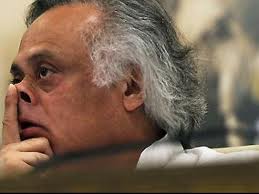
New Delhi, July 27: Terming India as world's capital for open defecation, Drinking Water and Sanitation Minister Jairam Ramesh on Thursday said that 100,000 "bio-toilets" will be installed in about 300 backward gram panchayats in the next two years at a cost of Rs 150 crore.
"We are the world's capital for open defecation. It is a matter of shame, anguish, sorrow, anger," Ramesh said, noting over 60 percent of all open defecation takes place in India.
Speaking at a a function where a memorandum of understanding on bio-digester-based eco-friendly toilets was exchanged between the Defence Research and Development Organisation (DRDO) and the ministry in his and Defence Minister AK Antony's presence, Ramesh said the government intended to rid the country of open defecation in the next 10 years.
Ramesh, who is also rural development minister, said DRDO-developed bio-toilet had immense use for Indian Railways. He said his ministry had offered to equip it in all new railway coaches and share half the cost of retrofitting it in all the existing 50,000 coaches in the next four to five years. The project will cost about Rs 500 crore.
The minister said bio-toilets will also help curb manual scavenging which was still prevalent in about 15 lakh insanitary latrines.
He said the ministry intended to provide bio-toilets to 1,000 gram panchayats over the next four-five years. The minister said that funds for setting up bio-toilets will be provided by his ministry and DRDO and its private partner will be responsible for technology.
Ramesh said of 240,000 gram panchayats, only 28,000 had achieved the status of "nirmal gram" and his ministry intended that all panchayats achieve the status over the next 10 years.
Antony said that bio-toilet was a spin off from technology developed by DRDO for eco-friendly disposal of human waste for armed forces deployed in high altitude locations.
Minister of State for Statistics and Programme Implementation Srikant Jena said he would write to MPs for keeping apart money from MPLADS scheme for installing bio-toilets in their area.
DRDO bio-toilet is based on anaerobic biodegradation of organic waste by unique microbial consortium and works at wide temperature range. The onsortium has been made through acclimatisation, enrichment and bioaugumentation of cold-active bacteria collected from Antartica and other low temperature areas.





Comments
Add new comment